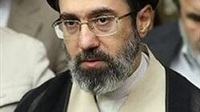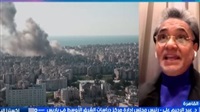In His First Interview After Winning the Post of UNESCO Director-General, Dr. Khaled El-Enany Speaks to Al-Bawaba

“My victory is a global vote of
confidence in Egypt’s vision and its ability to lead an organization like
UNESCO.”
![]()
A Historic Moment
On the sixth of October — Egypt’s
Victory Day — Dr. Khaled El-Enany achieved a historic triumph by winning the
post of Director-General of UNESCO, becoming the first Egyptian and Arab to
hold this prestigious position.
His sweeping victory, with 55 votes
out of 57, marked the highest result ever recorded in UNESCO elections,
crowning more than thirty months of intense diplomatic work led by the Egyptian
Ministry of Foreign Affairs under the direct guidance of President Abdel Fattah
El-Sisi.
Dr. El-Enany’s win reflects a national
vision: Egypt’s candidacy was not a mere political contest but a comprehensive
national project meant to reaffirm Egypt’s cultural leadership and its
centuries-old contribution to human civilization.
![]()
A Journey Rooted in Knowledge and
Heritage
From his early academic years at
Helwan University, Dr. El-Enany combined scholarship with passion. Since 1993,
he has devoted his life to Egyptology, inspiring generations of students.
His tenure as Minister of Antiquities
(2016) and later Minister of Tourism and Antiquities (2019) reflected a unique
synthesis of science and practice — reviving Egypt’s cultural image through
initiatives that linked heritage to sustainable development and cultural
diplomacy.
For him, heritage is not the past on
display; it is a living present, and tourism is not luxury, but dialogue among
civilizations.
![]()
“We Worked for a Cause, Not a Title”
Q: Did you expect this unprecedented
victory with 55 votes?
El-Enany: I always believed that
sincere work never goes in vain. I did not approach the elections with
overconfidence, but with a deep sense of responsibility.
The result was the outcome of a
collective Egyptian, Arab, African, and global effort — a triumph of values
such as fairness and mutual respect, not merely a political win.
Fifty-five votes are not just a
number; they represent the world’s trust in Egypt’s vision and in our capacity
to lead UNESCO with a human-centered approach.
I sincerely thank the Egyptian state
and its leadership for their unwavering support, and the Ministry of Foreign
Affairs for conducting this campaign with dedication and professionalism.
![]()
The Election Campaign: A Global Effort
Q: Tell us about the campaign’s
structure and its main ideas.
El-Enany: The campaign was a genuine
epic of teamwork that extended over many months. It was led by the Egyptian
state, with the Ministry of Foreign Affairs at the forefront, and received
direct backing from the President.
We operated on every front —
diplomatic visits, international meetings, and global outreach.
The file we presented was not a
marketing brochure; it was an intellectual and strategic vision that linked
education, culture, science, heritage, and peace.
Our goal was never to seek the
position for Egypt’s sake alone, but to put our historical experience at the
service of humanity.
Every meeting was a chance to build
new bridges of trust — and the world voted for that value, not for an
individual.
![]()
Vision and Challenges
Q: What were the main ideas in your
program, and what challenges did you face — especially after the U.S.
withdrawal from UNESCO?
El-Enany: Our campaign file was a
complete plan to revitalize UNESCO.
We focused on the human face of the
organization — bringing it closer to people, strengthening its field presence,
and ensuring balanced cultural representation.
We proposed linking heritage with
development, transforming culture into an economic resource, and empowering
youth and women in decision-making.
The greatest challenge was the complex
international political climate and the withdrawal or reduced participation of
some major countries.
We faced this with flexibility and
faith that UNESCO must remain the home of humanity, not a hostage of politics.
Our campaign was political in scope
but profoundly human in spirit — driven by conviction that education and
culture are the surest paths to lasting peace.
![]()
Facing Global Environmental Challenges
Q: How can UNESCO play a stronger role
in addressing environmental issues like climate change and biodiversity loss,
especially with the upcoming COP30 Conference in Brazil?
El-Enany: Environment is not a
separate file; it is the core of human awareness.
UNESCO manages a wide network of
natural reserves and biosphere sites, key to protecting biodiversity worldwide.
At COP30 in Brazil, we will launch
initiatives focused on environmental education, integrating sustainability into
school curricula, and supporting scientific research on climate change and its
impact on cultural and natural heritage.
We will also strengthen cooperation
among universities and research centers, especially in developing countries, to
make environmental knowledge accessible to all.
Our duty is to connect science with
conscience, reminding the world that Earth is not a resource to exploit, but a
legacy to protect for future generations.
![]()
On the Withdrawal of Major Members
Q: The withdrawal of some countries,
such as the United States, impacts UNESCO’s budget and programs. How will you
address this?
El-Enany: The withdrawal of any major
member leaves its mark — financially, politically, and symbolically.
Yet UNESCO’s mission is larger than
any single withdrawal. Its true strength lies in the diversity and solidarity
of its members.
We are diversifying funding sources
through partnerships with the private sector, cultural and educational
institutions, and development banks.
We also encourage voluntary
contributions from member states to specific projects.
Projects previously funded by the U.S.
have been restructured into broader multilateral programs to ensure continuity.
Our goal is to preserve UNESCO’s
independence and sustainability — culture and science must serve humanity
beyond political divisions.
![]()
Revisiting UNESCO’s Heritage
Conventions
Q: After decades, do you think
UNESCO’s heritage conventions need updating?
El-Enany: Indeed, this question
strikes at the heart of the organization’s evolution.
The conventions of the 1970s and 1990s
were groundbreaking — they introduced the concept of “shared human heritage.”
But today’s world has changed
profoundly: environmental, technological, and social realities demand new
mechanisms and fairer cultural representation.
We must strengthen technical support
for developing countries and ensure a more balanced global heritage list that
truly reflects humanity’s diversity.
![]()
Priorities and Strategic Vision
Q: What are your main priorities for
the coming phase?
El-Enany: My priorities revolve around
Humanity, Knowledge, and Peace, built upon four main pillars:
1.
Education — the foundation of all development, focusing on
digital equality and preparing future generations without losing their human
values.
2.
Culture and Heritage — transforming heritage into an
economic driver that empowers local communities and creates youth
opportunities.
3.
Science and Innovation — promoting research in environment,
water, and sustainable energy, and building bridges between North and South.
4.
Peace and Cultural Dialogue — because dialogue among
peoples is no longer a luxury; it is a necessity for survival.
Our strategy rests on Partnership,
Transparency, and Field Effectiveness.
We will make UNESCO closer to people,
more present on the ground, and less burdened by bureaucracy.
My message is to restore the
organization’s original spirit — a global home for reason and conscience,
leading humanity toward a fairer and more beautiful future.
![]()
A Message to the Youth
El-Enany: My message to young people
is simple yet profound: You are not merely the future — you are the living
present of our world.
Peace is not created only in
conferences but begins with an idea in young minds and an initiative in schools
and communities.
Make education your tool to change
reality, not merely a path to employment.
Sustainable education liberates the
mind, teaches respect for others, and shows that diversity is strength, not
threat.
UNESCO will be your partner in
building a world that is more aware, just, and peaceful.
![]()
Dr. Khaled El-Enany — A Legacy of
Pride
- PhD in Egyptology from Paul-Valéry University –
Montpellier III, France (2001), where he later served as Visiting
Professor eight times between 2006–2013 and again in 2023.
The university awarded him an Honorary
Doctorate in 2024.
- Served as Minister of Antiquities (2016) and later as
Minister of Tourism and Antiquities (2019) — the first to hold both
portfolios simultaneously.
- Recipient of several distinguished honors:
- Chevalier de la Légion d’Honneur – France (2025)
- Order of the Rising Sun – Japan (2021)
- Order of Merit – Poland (2020)
- Chevalier des Arts et des Lettres – France (2015)
- Patron of the African World Heritage Fund (2025)
- Cultural Tourism Ambassador – UNWTO (2024)
- Honorary Member – French Society of Egyptology (2016)
- Corresponding Member – German Archaeological
Institute, Berlin (2015)











